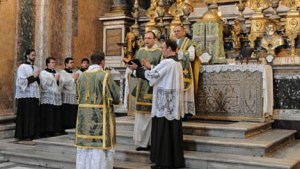Lenten Campaign 2025
This content is free of charge, as are all our articles.
Support us with a donation that is tax-deductible and enable us to continue to reach millions of readers.
Similar to the English word “Easter,” the word “Lent” was originally a secular word with no particular religious associations.
The word is traced etymologically to an Old English word lencten(related to “lengthen,” referring to the lengthening of days) that simply referred to the season of spring. It is also related to a Teutonic word with the same meaning.
The penitential season in the Church always fell during the springtime in Europe and over the centuries the word “Lent” became synonymous with the liturgical period. Additionally, for the Anglo-Saxon people it was an easier word than the official Latin title. In Latin it is called quadragesima, which means the “40 days” (or more literally the “40th day” before Easter). This term identifies the season with the 40-day period of preparation before the celebration of Jesus’s Passion, death and resurrection.
Time of Renewal
Nevertheless, spiritual writers have pointed out how this identification is spiritually beneficial. Lent is generally seen as a time of spiritual renewal, a type of “spiritual spring,” when a soul is renewed in fervor and cleansed of all impurities. Saint John Paul II summarized it well during a General Audience in his pontificate.
Here then is revealed the meaning and necessity of the Lenten season which, by its call to conversion, leads us through prayer, penance and acts of fraternal solidarity to renew or reinvigorate our friendship with Jesus in faith, to free ourselves from the deceptive promises of earthly happiness and once again to savour the harmony of the interior life in authentic love for Christ.

Read more:
Here’s why some Christians observe 70 days of Lent

